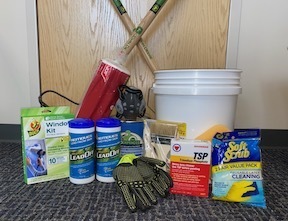
This summer, CCI partnered with the Notre Dame Lead Innovation Team (ND LIT) on an innovative project in the South Bend community. ND LIT members Dr. Heidi Bedinger and Christopher Knaub mentored a four person intern team of area undergraduate and high school students tasked with researching and implementing do-it-yourself (DIY) lead remediation techniques in the South Bend Community. This project was a continuation from the 2021 CCI Winter Term intern project, which conducted a literature review on DIY lead remediation techniques nationwide.
The interns - Notre Dame Chemical Engineering students Conlan Jarvis (‘22), Deirdre Lagore (‘22) and Ntandoyakhe Tshuma (‘24), and Washington High School Health Magnet student Jennifer Leon - were tasked with building upon the initial literature review, building a framework for a lead remediation kit, and recruiting participants for the lead remediation kit implementation. During the process, the team learned that having only one lead remediation kit design would not work for every home. Instead, it was important through the intake process to gauge the needs of the homeowners and customize each kit to meet those needs. “Each homeowner’s situation was different, so we had to adapt our process depending on the condition of the home. It was really important to us to form a trusting relationship with the homeowners so they would allow us to help them to the best of our abilities,'' said Jarvis.
Throughout the eight weeks, the intern team conducted research, created a budget for supplies, ordered supplies, conducted 7 intake visits for new program participants, and implemented the lead remediation kit at two homes in the South Bend community. “Lead mitigation strategies are not easily understood and the research on their efficacy is dated. We had a steep learning curve ahead of us, but our student intern team brought a level of enthusiasm and skill that made the research less daunting,” said Dr. Beidinger.
The work that was conducted by the intern team was so successful that three of the interns were able to continue to work on the project during the academic year with Dr. Beidinger.